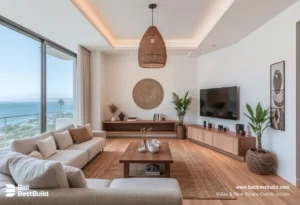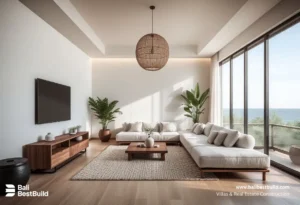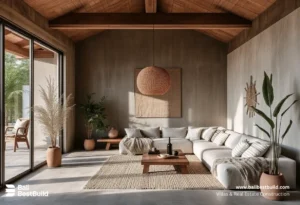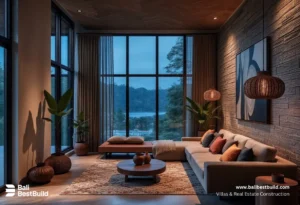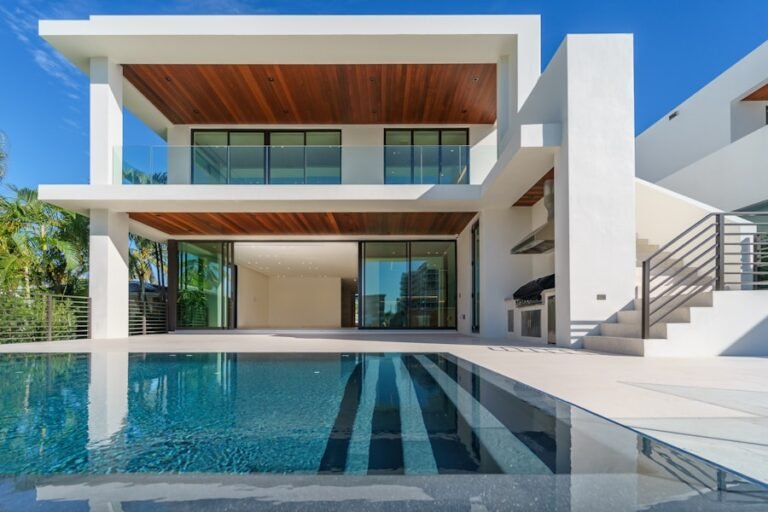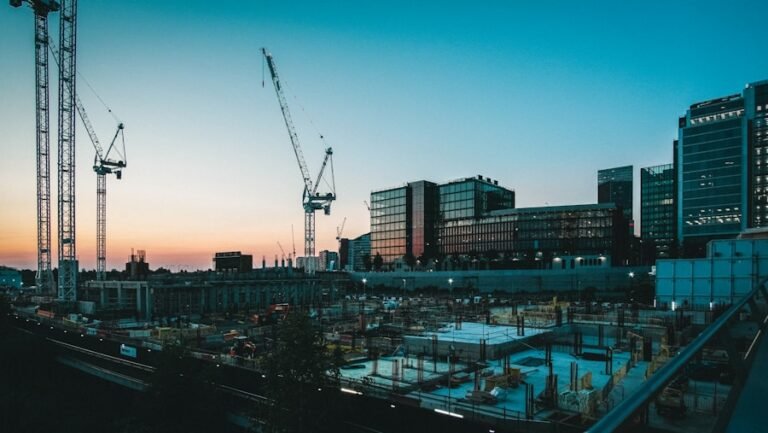Bali has long been a popular destination for tourists and expats alike, and as a result, the property market on the island has been booming in recent years. Understanding the Bali property market is crucial for anyone looking to invest in real estate on the island. The market is diverse, with a wide range of properties available, from luxury villas to budget-friendly apartments. Prices can vary significantly depending on the location, size, and amenities of the property. It’s important to do thorough research and work with a reputable real estate agent to ensure you are making a sound investment. Additionally, it’s important to consider the legalities and regulations surrounding property ownership in Bali, as foreign ownership of land is restricted in Indonesia. Working with a knowledgeable legal team can help navigate these complexities and ensure a smooth transaction.
Furthermore, it’s important to consider the potential for rental income when investing in Bali property. With the island’s popularity as a tourist destination, many property owners are able to generate significant income by renting out their properties to vacationers. This can be a lucrative opportunity for investors, but it’s important to carefully consider factors such as location, amenities, and market demand when choosing a property for rental purposes. Overall, understanding the Bali property market requires careful consideration of various factors, including legalities, potential rental income, and market trends. Working with experienced professionals can help ensure a successful investment in Bali real estate.
Planning Your Bali Property Renovation
Once you have acquired a property in Bali, the next step is often to plan for renovations or improvements. Whether you are looking to update an existing property or build from the ground up, careful planning is essential for a successful renovation project. The first step in planning your Bali property renovation is to clearly define your goals and budget. Consider what improvements are most important to you and how much you are willing to invest in the project. It’s also important to consider the local building codes and regulations in Bali, as these can impact the scope and cost of your renovation. Working with a reputable architect or design firm can help ensure that your renovation plans comply with local regulations and are well-executed.
In addition to planning the design and scope of your renovation, it’s important to carefully consider the timeline for the project. Renovations in Bali can be complex and time-consuming, especially if you are working with local contractors and suppliers. It’s important to set realistic expectations for the timeline of your renovation and to work closely with your team to ensure that deadlines are met. Finally, it’s important to consider the environmental impact of your renovation project. Bali is known for its natural beauty, and it’s important to take steps to minimize the environmental impact of your renovation. This may include using sustainable materials, incorporating green design elements, and working with local suppliers who prioritize environmental responsibility. Overall, careful planning is essential for a successful Bali property renovation, and working with experienced professionals can help ensure that your project is completed on time and within budget.
Finding the Right Team for Your Bali Renovation Project
Finding the right team for your Bali renovation project is crucial for a successful outcome. Whether you are looking for architects, contractors, interior designers, or suppliers, it’s important to carefully vet potential partners to ensure they have the experience and expertise needed for your project. One of the best ways to find the right team for your Bali renovation project is through referrals from trusted sources. Ask friends, colleagues, or real estate agents for recommendations, and be sure to check references and portfolios before making any decisions. Additionally, it’s important to consider the specific needs of your project when choosing a team. For example, if you are renovating a traditional Balinese villa, you may want to work with a team that has experience in preserving and enhancing traditional design elements.
Furthermore, communication is key when working with a team on a Bali renovation project. It’s important to establish clear lines of communication from the outset and to maintain regular contact throughout the project. This may include regular meetings, progress updates, and open dialogue about any concerns or changes that arise during the renovation process. Finally, it’s important to establish clear expectations and agreements with your team before beginning work on your renovation project. This may include contracts, timelines, and payment schedules that outline the responsibilities of each party involved. By finding the right team for your Bali renovation project and maintaining open communication throughout the process, you can ensure that your project is completed to your satisfaction.
Navigating Permits and Regulations in Bali
Navigating permits and regulations in Bali can be a complex process, especially for those who are unfamiliar with local laws and customs. Before beginning any renovation project in Bali, it’s important to understand the legal requirements and obtain any necessary permits or approvals. This may include building permits, environmental impact assessments, or other regulatory approvals depending on the scope of your project. Working with a knowledgeable legal team or consultant can help ensure that you are in compliance with local regulations and can help expedite the permit process.
Additionally, it’s important to consider any cultural or historical preservation requirements that may impact your renovation project in Bali. The island is home to many culturally significant sites and traditional Balinese architecture, and it’s important to respect and preserve these elements when undertaking a renovation project. This may include working with local preservation organizations or consulting with experts on traditional Balinese design to ensure that your renovation is respectful of local customs and traditions. Overall, navigating permits and regulations in Bali requires careful consideration of legal requirements, cultural preservation concerns, and local customs. Working with experienced professionals can help ensure that your renovation project is in compliance with all necessary regulations and is respectful of local traditions.
Choosing the Right Materials for Your Bali Renovation
Choosing the right materials for your Bali renovation is crucial for achieving the desired aesthetic and functionality of your property. Bali is known for its natural beauty and rich cultural heritage, and many property owners choose to incorporate traditional Balinese materials into their renovation projects. This may include materials such as teak wood, natural stone, bamboo, or traditional Balinese tiles. These materials not only add an authentic touch to your renovation but also contribute to the overall sustainability of your project by using locally sourced materials.
In addition to traditional Balinese materials, it’s important to consider the climate and environmental conditions in Bali when choosing materials for your renovation. The island experiences high humidity and heavy rainfall at certain times of the year, so it’s important to choose materials that are durable and resistant to these conditions. This may include using materials such as treated wood, weather-resistant roofing materials, or high-quality finishes that can withstand the elements. Furthermore, it’s important to consider the environmental impact of the materials you choose for your renovation project. Many property owners in Bali are increasingly choosing sustainable materials such as recycled wood, natural fibers, or low-impact finishes that minimize their environmental footprint. By carefully considering the materials for your Bali renovation project, you can achieve a beautiful and sustainable result that reflects the natural beauty of the island.
Incorporating Balinese Design Elements into Your Renovation
Incorporating Balinese design elements into your renovation can add an authentic touch to your property while honoring the rich cultural heritage of the island. Traditional Balinese architecture is characterized by open-air spaces, natural materials, intricate carvings, and lush gardens that create a harmonious connection between indoor and outdoor spaces. When renovating a property in Bali, many owners choose to incorporate these design elements into their projects to create a sense of place that reflects the unique beauty of the island.
One way to incorporate Balinese design elements into your renovation is through traditional architectural features such as alang-alang thatched roofs, carved wooden doors and windows, or open-air pavilions known as bale. These features not only add an authentic touch to your property but also contribute to a sense of tranquility and connection with nature that is characteristic of traditional Balinese design. Additionally, many property owners choose to incorporate traditional Balinese landscaping elements such as water features, lush tropical gardens, or stone pathways that create a serene and inviting atmosphere.
Furthermore, incorporating Balinese design elements into your renovation can also include interior design features such as hand-carved furniture, traditional textiles, or decorative elements inspired by Balinese art and culture. These details add a sense of warmth and authenticity to your property while honoring the rich artistic traditions of Bali. By carefully considering how to incorporate Balinese design elements into your renovation project, you can create a space that reflects the unique beauty and cultural heritage of the island.
Maintaining Your Bali Property After Renovation
Once your Bali property renovation is complete, it’s important to establish a maintenance plan to ensure that your investment remains in top condition for years to come. The tropical climate in Bali can be harsh on properties, so regular maintenance is essential for preserving the beauty and functionality of your renovated space. This may include regular inspections of roofing and structural elements, cleaning and sealing outdoor surfaces such as decks or patios, or maintaining landscaping features such as gardens or water features.
In addition to regular maintenance tasks, it’s important to consider any specific maintenance needs related to the materials or design elements used in your renovation project. For example, if you have incorporated traditional Balinese materials such as teak wood or natural stone into your property, it’s important to follow specific care guidelines to ensure their longevity and beauty over time. This may include regular cleaning and sealing of wood surfaces or using specific products designed for natural stone care.
Furthermore, it’s important to establish relationships with local maintenance providers who can assist with ongoing care for your property. This may include gardeners, pool maintenance professionals, or general contractors who can assist with any repairs or updates that may be needed over time. By establishing a comprehensive maintenance plan for your Bali property after renovation, you can ensure that your investment remains in top condition for years to come.
In conclusion, investing in a property in Bali can be an exciting opportunity for those looking for a beautiful and culturally rich location for their home or investment property. However, navigating the complexities of the Bali property market requires careful consideration of various factors including legalities, potential rental income, and market trends. Once you have acquired a property in Bali, careful planning is essential for a successful renovation project including defining goals and budgeting appropriately while considering local building codes and regulations.
Finding the right team for your Bali renovation project is crucial for a successful outcome including architects, contractors, interior designers or suppliers who have experience working on similar projects in Bali while maintaining open communication throughout the process.
Navigating permits and regulations in Bali requires careful consideration of legal requirements including building permits or environmental impact assessments while considering any cultural or historical preservation requirements that may impact your renovation project.
Choosing the right materials for your Bali renovation is crucial for achieving the desired aesthetic while considering traditional Balinese materials such as teak wood or natural stone while considering sustainable materials such as recycled wood or low-impact finishes.
Incorporating Balinese design elements into your renovation can add an authentic touch while honoring the rich cultural heritage of the island including traditional architectural features such as alang-alang thatched roofs or open-air pavilions known as bale while incorporating traditional Balinese landscaping elements such as water features or lush tropical gardens.
Maintaining your Bali property after renovation is essential for preserving its beauty including regular inspections of roofing and structural elements while considering any specific maintenance needs related to the materials or design elements used in your renovation project.
Overall investing in a property in Bali can be a rewarding experience but requires careful consideration of various factors including understanding the market trends planning renovations finding the right team navigating permits choosing materials incorporating design elements maintaining after renovations all while respecting local laws customs traditions and environment on this beautiful island.

